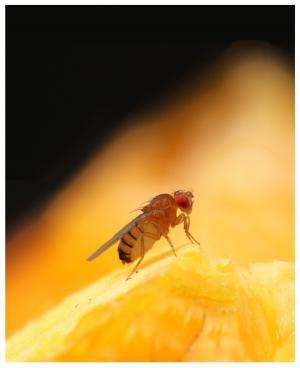Those fruit flies are pickier than you think

On your kitchen counter, it might seem as though fruit flies will show up for just about any type of fruit you leave around for them. But when given a choice about where to lay their eggs, those flies will go for citrus most of the time, new work shows. The basis for that seemingly complex food preference is surprisingly simple, according to a report in the Cell Press journal Current Biology on December 5. It boils down to a single odorant receptor found on a single class of sensory neurons.
"When it comes to egg-laying, flies are more picky than previously thought," says Marcus Stensmyr, who is now at Lund University. "They are not indiscriminately using any old fruit encountered, but show a clear preference towards citrus."
The new work suggests a very good reason for the flies' preference. Parasitoid wasps that would like to turn fly larvae into food for their young have an aversion to citrus, Stensmyr and his colleague Bill Hansson from the Max Planck Institute for Chemical Ecology show. As a result, fly larvae kept on substrates laden with citrus-derived ingredients suffer a reduced risk of parasitism.
Citrus has a very characteristic smell, derived from a handful of chemical ingredients (and limonene in particular), the researchers explain. Those chemicals are the basis for the flies' preference, driven by a single receptor known as Or19a. Flies lacking that one receptor lose their ability to identify and select an apple versus an orange.
The discovery is another example of how seemingly complex behaviors can be driven by relatively simple underlying mechanisms.
"Complex behaviors can often be broken down into multiple subroutines," Stensmyr says. "Although the ensuing behavior in the end is complex, each of the subroutines that together feed into the decision process can have a simple genetic basis."
So why don't wasps go for citrus if there are fly larvae to be found? It's not entirely clear, Stensmyr and Hansson say, but there might be other aspects of citrus fruit—their thick skin, perhaps—that make them unsuitable for wasps. And, as anyone who has ever left a banana around too long knows, flies will settle for other fruits, too.
For those of you at home, however, it might be worth rethinking those aging limes and lemons at the bottom of that fruit bowl.
More information: Current Biology, Dweck et al.: "Olfactory Preference for Egg Laying on Citrus Substrates in Drosophila." dx.doi.org/10.1016/j.cub.2013.10.047
Journal information: Current Biology
Provided by Cell Press



















